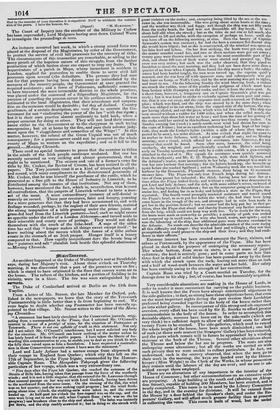An instance occurred last week, in which a strong armed
force was placed at the disposal of the Magistrates, by order of the Government, to protect the service of civil bill processes for the recovery of tithe. The circumstances of this transaction are remarkable, as adding to the many proofs of the hopeless nature of this struggle, from the further protraction of which faction alone can expect to reap any fruits. The sequestrators of a parish in Mayo, whose incumbent is resident in London, applied for protection to enable them to serve civil bill processes upon several tithe defaulters. The persons they bad sent out for that purpose having been driven away or intimidated by the menaces of the country-people, the Government at once granted the required assistance; and a force of Policemen, sufficiently numerous to have traversed the most intractable district in the whole province, was placed under the command of a Stipendiary Magistrate, for the purpose of guarding the process-server in his perilous mission. It was intimated to the local Magistrates, that their attendance and coopera- tion on the occasion would be desirable; but they all declined. Country gentlemen, of a certain description, are very free to censure the Go- vernment for not "vindicating the power of the law " with due rigour ; but it is their own practice almost uniformly to hold back, when a proper occasion for doing so arises. They will not lend their counte- nance either to the Government or to the clergyman in such trying emergencies ; but sit at home by the fire, and pass their solemn judg- ment upon the " sluggishness and cowardice of the Whigs ! " In this matter, however, the refusal of the Great Unpaid was not of much consequence ; for a process-server could not be procured in the whole county of Mayo to venture on the expedition ; and so it fell to the ground.—Morning Chronicle.
There need no special instances to prove that the aversion to tithes in the minds of the Irish people continues unabated. But one has recently occurred so very striking and almost preternatural, that it ought to be mentioned. The seizure and sale of a farmer's cows for tithe by Mr. Croker, the Rector of Croom, has been noticed in all the papers. The Tory journals treat it as a kind of triumphant exploit ; and record, with many compliments to the disinterested generosity of Mr. Croker, that he was himself the purchaser of the cattle, which he presented as a free gift to the House of Industry in Limerick, to be distributed among the inmates of that institution. Not any of them, however, have mentioned the fact, which is, nevertheless, true beyond all contradiction, that the paupers of Limerick refused to taste a mor- sel of the meat. A more extraordinary instance of self-denial is scarcely on record. Those poor creatures, faint and hungry, yearning for a more generous diet than they bad been accustomed to, and with feelings wounded, perhaps, by the neglect of their own friends, resisted the strong temptation of a table groaning under the prime joints of grass-fed beef from the Limerick pastures—beef, such as might create an appetite under the ribs of a London Alderman—and turned aside to their miserable and scanty mess of pottage. They would not defile themselves with the touch of the tithe-beef. A sage of the olden time has said that " hunger makes all things sweet except itself :" be knew nothing about the nausea which the fumes of a tithe sirloin create in the stomach of an Irish pauper. Hunger itself is a luxury compared to that. How vapidly insignificant does the heroic brag of the " potatoes and salt" pluralist look beside this splendid abstinence. —Morning Chronicle.


























 Previous page
Previous page